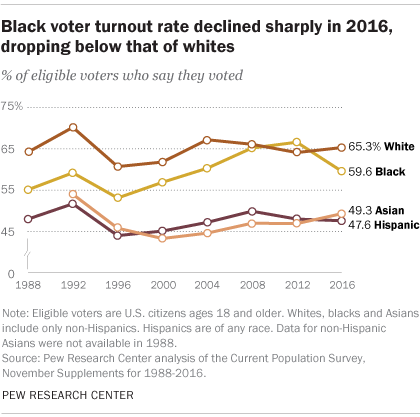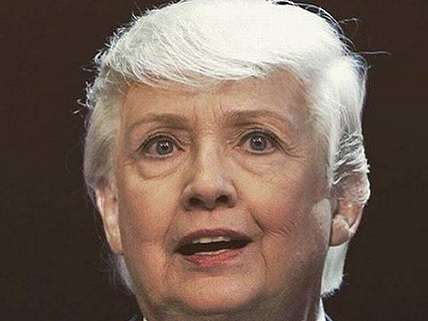The Non-Mystery of Black-Voter Turnout Decline in 2016 [Media Bias Edition]
In the era of Donald Trump, basic media literacy has never been more necessary.

"Black voter turnout rate declined sharply in 2016, dropping below that of whites" reads the ominous headline at Pew Research's "Fact Tank" site. The sentiment—and the whisper of voter suppression by white Republicans—is mirrored in dozens of news stories covering the topic. How quickly we forget what is likely to happen when the two major parties run candidates who were historically disliked, distrusted, and dismissed by the public: You get less voters. As Pew notes in passing, overall voter participation, the percentage of eligible voters who bothered casting a ballot, was lower in 2016 (61.4 percent) than it was in 2008 (63.6 percent).
That's not a sexy story, though, is it, especially in a country overseen by a brute who is the least-popular president in recorded history?
So what is the simplest explanation for the drop in black-voter turnout between 2016 and 2012? Surely it's Hillary Clinton, as the GOP share of the black vote hasn't cracked more than 15 percent since 1960. Her enthusiasm gap among all voters was widely noted and understood, even as Barack Obama's support among African Americans was sky-high.
The Pew writeup is interesting less for what it tells us about voting trends and more for how the media frames things. "A record 137.5 million Americans voted in the 2016 presidential election," begins Pew's account, even as the authors acknowledge later that fewer eligible voters showed up, despite increasingly easy ways to cast ballots. Raw numbers in a country whose population is growing are essentially meaningless, but leading with them does work to make the reduction in black-turnout numbers seem troubling (turnout for women, Latinos, and Asians was essentially unchanged). However, if you put aside Obama's two campaigns, blacks turned out in the same percentage as they did in 2004, when John Kerry was facing one of the least-popular incumbents in the past 50 years and last year, blacks turned out in higher percentages than they did in every election since 1992, a generational-change election featuring a young Southern governor from Arkansas who reached out to minorities in a potent and purposeful way.

The real story about turnout in 2016 is that despite the scorched-earth tactics of both major parties and candidates, voters didn't flock to the polls to stave off impending doom. That's a result that makes me hopeful that 2016 was indeed the final election of the 20th century, an ugly fistfight between old baby boomers who have no idea of what the world is like anymore. For all their attacks and jawing, neither Clinton nor Trump brought anything substantively new to the table in terms of policy and forward-looking vision. Clinton and her main Democratic rival Bernie Sanders were essentially calling for a return to 1970s-style governance big on expert rule. Whether he's talking about nonexistent crime waves, coal mining, or industrial jobs that peaked as a part of the economy decades ago, Trump is frankly nostalgic for the world in which he grew up.
I submit that many of us intuited that whichever person got elected, we understand we are in a pause before the federal government starts to seriously reflect the massive and ongoing changes that have dramatically remade our commericial, cultural, and personal lives so much for the better. We do not have an inexhaustible amount of time on our side—old-age entitlements are bankrupting the country and autopilot deficit spending is already muffling economic growth—but the pickings were slim last fall, at least among major-party candidates. Here's pushing for 2020 to have a better cast of characters who will offer a reason to vote in larger numbers. And, while I'm making wishes, media that analyze trends more dispassionately.
